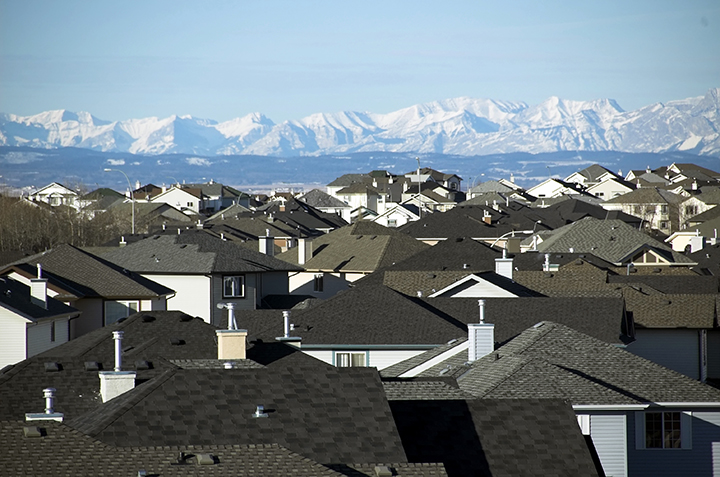It seems like light-years ago since ‘location-location’ was the driver of real estate.
Today, Calgary real estate is impacted by variables like benchmark prices, affordability, mortgage rates, listings and inventory, migration, consumer confidence. There’s also some relatively recent turbulence. Wondering what the new federal government will do, especially when it comes to housing and some consumer jitters about prices and inflation, sparked by Donald Trump’s bluster and the impact of U.S. tariffs on Canada’s economy.
Calgary’s 2025 real estate market continues a bit of a roller coaster, with ups and downs, positives and challenges, with Calgary homebuyers, sellers and realtors wondering if it translates into random speedbumps or longer-term trends.
CMHC forecasts that housing starts will slow down from now until 2027, mainly due to fewer condominium apartments being built, while total starts will remain above their 10-year average. According to CMHC, rental apartment construction will remain high but may slow in 2027 as demand eases.
Ground-oriented homes (detached, semi-detached, row) may recover slightly, especially in more affordable options like row houses.
The Canadian Real Estate Association (CREA) anticipates a rebound in market activity due to pent-up demand and lower borrowing costs, but predicts that Canadian home prices will fall as buyers wait out the 2025 uncertainty. CREA data shows that in Q1, home sales in Canada fell for the fourth straight month, down 20 per cent from last winter.
Among real estate number-crunchers, the economic uncertainty triggered primarily by Trump’s chaotic trade war is singled out for making Canadian homebuyers squeamish about taking the housing plunge.
In Calgary, CREB points out that despite the recent federal election, the economic uncertainty driven primarily by tariff threats and prices is weighing on Calgary consumer confidence and impacting the real estate market.
The spring 2025 numbers show that sales declined by 19 per cent year-over-year, slowing across all property types, with the steepest declines in higher-density segments.
“It is not a surprise to see a pullback in sales given the uncertainty,” says Ann-Marie Lurie, Chief Economist at CREB®. “However, it is important to note that sales remain stronger than anything reported throughout 2015 to 2020, where our economy faced significant economic challenges and job loss.
“Nonetheless, easing demand has been met with gains in new listings and rising inventories, helping our market shift back toward balanced conditions, following four consecutive years where the market favoured the seller.”
Realtors and market analysts point to mortgage rates as a stable positive for Calgary real estate.
At the end of April (Q1), the average five-year fixed rate from the Big 5 Banks was 4.7 per cent, and the lowest five-year fixed mortgage rate was 3.79 per cent. The lowest five-year variable mortgage rate was 3.95 per cent.
Lower Canadian mortgage rates generally stimulate the real estate market by increasing buyer demand and potentially boosting prices. Canada’s 2024 and early 2025 mortgage rate drops were undisputedly a positive, because low mortgage rates translate into increased affordability, as it makes borrowing more affordable, reducing monthly mortgage payments, and enabling more people to enter the market or buy more expensive properties.
Lower mortgage rates also boost demand, because increased affordability and low borrowing costs lead to higher demand which can drive up prices, especially in competitive markets like Calgary.
Some real estate experts suggest the anticipation and hype about rate drops was a bit exaggerated. “Even the Bank of Canada has said they don’t expect to see changes or impacts for 18 to 24 months after rate adjustments,” notes Jarred Chamberlain, associate broker, and co-owner of Calgary’s Chamberlain Group.
“What will significantly affect our market is if we start seeing lower fixed rates, which is what is preferred by most Calgary buyers.
“The challenge is that we’re currently in an inverted rate environment. Typically, variable rates should be cheaper than fixed rates, but the opposite is true right now. For the market to normalize, fixed rates need to stabilize, allowing variable rates to drop below them. Once this happens, we’ll be back in a normal rate environment.”
Affordability and inventory will likely continue as key Calgary market factors for the second half of 2025.
“We consider it a ‘sellers market’ if we have less than three months of inventory,” says Doug Koop, broker/owner with Calgary’s RE/MAX Realty Professionals. “Overall, inventory is climbing which moves us closer to a balanced market. However, if you investigate different price ranges within it, there’s a very different story.
“For condos in the sub-$375,000 category, it is very much a sellers market because that is the sweet spot for investors and first-time homebuyers. The $375,000 condo market is already balanced. The same applies to detached homes. In the $1M price range, it is a sellers market, especially in the sub-$700,000 category. Over $1M it is a balanced market. So you really must look inside the numbers to fully see the true picture.”






